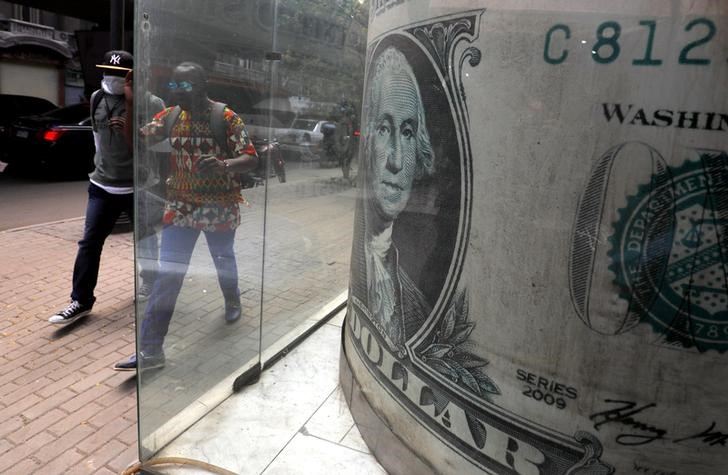By Patrick Werr
CAIRO (Reuters) - A small black market in the Egyptian pound has re-emerged in the last few days as the coronavirus takes a toll on the country's main sources of foreign currency, three bankers and businessmen said on Monday.
Some unofficial trades were taking place at 16.15 pounds to the dollar, compared to the 15.75 pounds offered by currency exchange bureaus and banks, they said.
Egypt has so far registered 327 cases of the respiratory disease caused by the virus, including 14 deaths, the health ministry said on Sunday.
The government last week suspended almost all commercial flights in an bid to control the spread, devastating the vital tourism industry that earned the country $12.5 billion in 2019.
The number of container ships passing through the Suez canal fell by 7.3% in February, an indication the coronavirus is dampening world trade, Al Mal reported on Monday.
A brisk carry trade in Egyptian treasury bills has slowed in the last few weeks, economists say, with foreign investors pulling dollars out of Egypt.
Still, with $45.51 billion (38.7 billion pounds) in foreign reserves as of end-February, Egypt has a strong armoury to support the currency - which has lost little value on official markets since the outbreak compared to currencies of other emerging market countries such as Russia, Turkey and South Africa.
Naeem Brokerage said in a note on Monday that the dollar was trading at 16.10-16.15 pounds in the parallel market, but that trade was very thin as importers postpone orders.
"Banks have begun rationing their FX inventories (prioritising on the imports of necessities) adjusting to the drop in inflows from tourism and hot money outflows," the note said.
"With interbank (foreign exchange) liquidity expected to dry up further in the coming months, we expect the (central bank) to intermittently plug the deficit by selling dollars to the banks," Naeem said, adding that it expected foreign reserves to decline by $1-1.5 billion a month.
On Tuesday, Naeem issued a correction of its note saying there was no parallel currency market.
The central bank closely manages the currency, sometimes putting pressure on banks not to let it weaken.
A licensed money changer in downtown Cairo said on Monday that retail trade had ground to a near halt in the last few weeks, with little demand for either dollars or pounds.
"The government has some tools to deal with this," said an Egyptian banker at a state bank who asked not to be named.
One step already taken was for banks to issue certificates of deposit (CDs) for Egyptian pound accounts, with a 15% guaranteed rate of interest over a fixed period to deter people from switching to dollar holdings, he said.
Another investment banker said colleagues had asked a state bank for dollars as a test. They were "asked to wait for 48 hours but were granted what they requested, but not before some negotiations regarding the quantity," he said.

In another move to deter dollarisation, the central bank on Monday told commercial banks to cut their interest rates on dollar deposits to one percentage point above the London Interbank Deposit Rate (Libor) from the previous one and a half percentage points.